| The factories that stood
alongside the BCN on the stretch from Cable Street to Bilston Road,
Wolverhampton. |
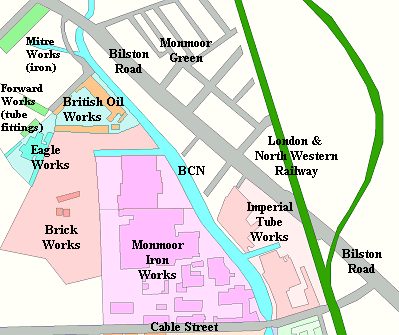 |
|
John Brotherton Limited Whilst still quite a
young man, John Brotherton settled in Wolverhampton and
founded his company, which became one of the largest
tube manufacturers in South Staffordshire, and was
known throughout the world for its high quality
products. |
|
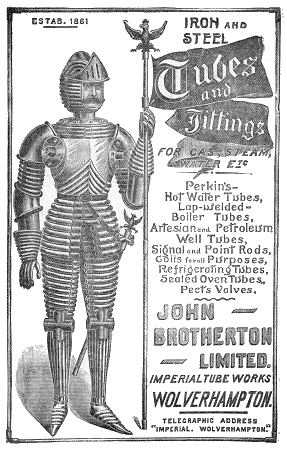
An advert from 1902. |
The company was founded in
1861 at Imperial Tube Works, Bilston Road,
Wolverhampton. They produced all kinds of tubes and
fittings for water, gas and steam. The company later
acquired another factory on the corner of Commercial
Road and Walsall Street. John Brotherton was born
in Walsall Street, Wednesbury on 20th September, 1829.
His parents were Richard Brotherton, a file cutter, and
Mary. Unfortunately Richard Brotherton died at an early
age, leaving his widow to bring-up their large family.
John started an apprenticeship at his uncle
Cornelius Whitehouse's gas and water tube works, first working in Wednesbury, and later
at his uncle's Monmore Green Tube Works in Wolverhampton. Mr.
Whitehouse greatly improved the manufacture of tubes, and invented many new techniques.
|
| John moved to
Wolverhampton, and in 1861 established the
Imperial Tube Works in Bilston Road, Wolverhampton in
partnership with Wordsworth Harrison, and John Kelly.
The firm produced a wide range of products including hot
water tubes, lap-welded boiler tubes, artesian and
petroleum well tubes, refrigeration tubes, sealed oven
tubes, steel and iron tubes for gas, water, and steam,
fittings for gas water and steam, tuyere, anvil, and
other coils, and railway signal and points rods. In
1869 John Kelly left the business, as was reported in
the October 1st 1869 edition of the London Gazette:
Notice is hereby given that the partnership for some time past
carried on by Messrs. Wordsworth Harrison, John Kelly, and John Brotherton, as Gas Tube Manufacturers,
under the firm of John Brotherton and Company, at Monmore Green
Works, Wolverhampton, in the county of Stafford, was this day
dissolved by mutual consent, so far
as regards the said John Kelly, by his retiring from the said
partnership concern, and the business will from henceforth be
carried on by the said Wordsworth
Harrison and John Brotherton alone, under the firm of John
Brotherton and Company, who will receive and discharge all
claims due and owing from or to the said
partnership concern. Dated this 23rd day of September, 1869.
Wordsworth Harrison.
John Brotherton.
John Kelly. |
|
By 1871 the firm employed around 100 men and 80 boys.
In about 1850 John married Mary Anne. The 1871 census
lists their first seven children: John aged 18,
Elizabeth aged 17, Mary Anne aged 14, Harriett aged 10,
James aged 9, Annie aged 7, and Thomas aged 5. At that
time they lived at 116 Dudley Road, Wolverhampton. |
| In the 1881 census they are listed as living in Penn
Road House, Wolverhampton. The family had
now grown to include: William aged 11, Alfred aged 10,
Albert aged 8, Horace aged 6, and Harold aged 3.
In1886 Imperial Tube Works became a limited company
which was known
as John Brotherton Limited.
For many years John served on Wolverhampton Council.
He was elected to the council in 1873 as one of the
representatives of St. George's Ward.
He was a
member of the town's Waterworks Committee, who
significantly
improved the local water supply, and in 1883 became mayor.
He greatly contributed to the town's Fine Arts and
Industrial Exhibition of 1884. |
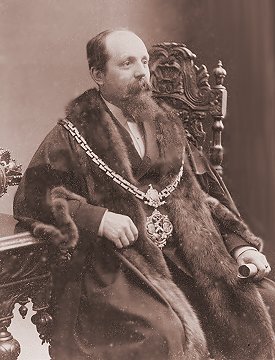
John Brotherton in his mayoral
robes. |
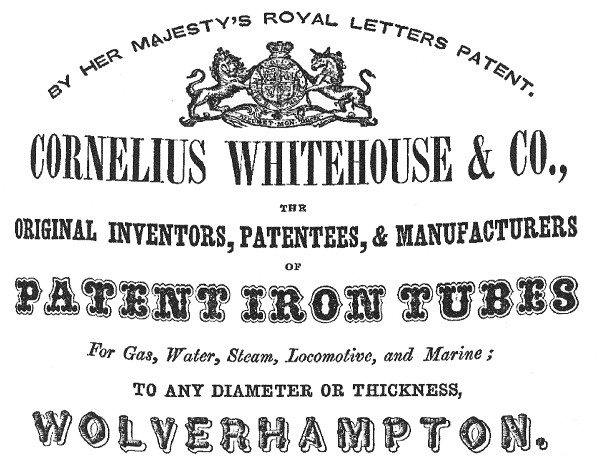
An advert from 1851.
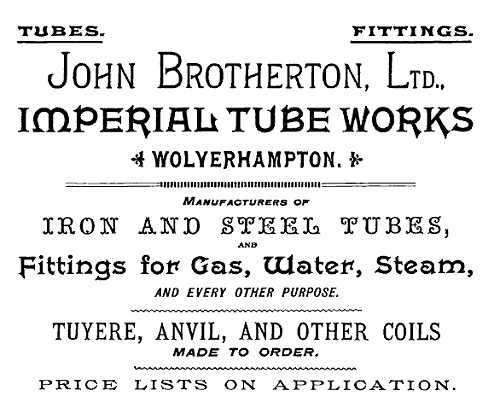
An advert from 1892.
|
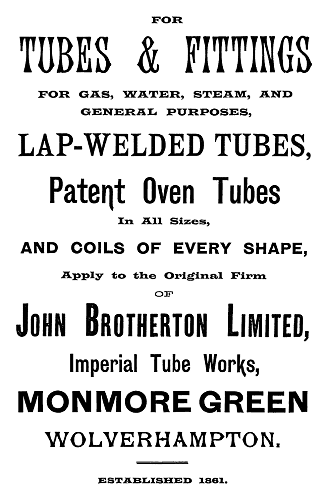
An advert from 1896. |
By 1891 the Brotherton family lived at The Woodlands
on Penn Road, a large house with an estate covering ten
and a half acres. On
27th May, 1895, William Frederick Brotherton who worked
in his father's business as an agent, married Nellie
Florence Gosnell.
In 1897 the New Brotherton Tube Company Limited was
formed, and on 26th October of that year the firm
acquired a second factory.
It was purchased from The Electric Construction
Corporation, and stood on the corner of Commercial Road and
Walsall Street. By 1914 the firm employed around 400
people. |
In 1896, the Brotherton family left The
Woodlands, which was purchased by Neville Mander. The old
house was demolished and replaced with the house that is
there today. In the 1911 census John and Mary Anne are
listed at 30 Chandos Road, Cricklewood, Willesden, the
home of their son William and his wife Nellie.
John and Mary Anne's last home together was in
Goldthorn Terrace off Goldthorn Road.
Sadly, Mary Anne died in December 1915, and was
buried at Merridale Cemetery on 21st of that month.
Almost two years to the day later, John died. He was
buried in the same grave on 15th December, 1917. In 1922
the business was sold-off.
On 18th June, 1923 the factory at Monmore Green was
sold to E. P. Jenks for £7,012 0s 9d. |
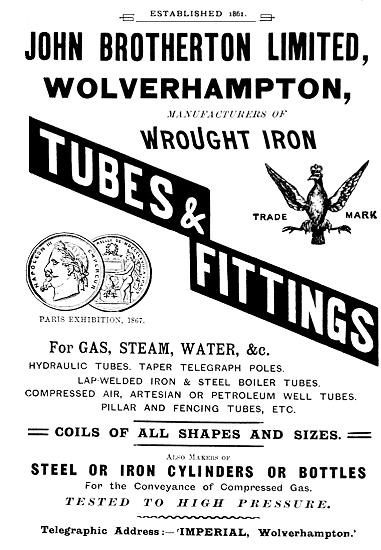
An advert from 1898. |
|
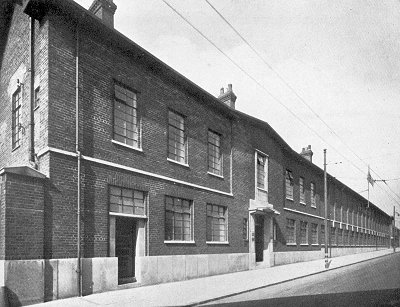
E.P. Jenks Limited, Bilston Road,
Wolverhampton. |
E. P. Jenks Limited The company was established in 1873 under the name of
Hyde & Sons, and were based in Jenner Street.
They made
washers and carried out small press work. In 1918 the
company was taken over by E. P. Jenks and it took his
name. |
| The
Brotherton Tube Company's site in Bilston Road was taken over by E. P.
Jenks in June 1923. The firm became a large producer of water
fittings made from hot brass stampings to give a greater
density of metal and exclude any possibility of
porosity. Also produced were brass rods and sections in
the extrusion department, which were sold
at home and abroad.
It became a public limited company in 1935.
In 1950 the company purchased a copper tube plant in
Birmingham and brought it to their Wolverhampton works
so as to add copper tubes to their range of products. A
plant for making copper billets was also installed.
Other products included water fittings such as taps and
valves, and brass wire. The business closed sometime
in the late 1960s |
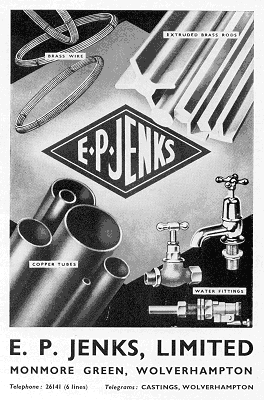
An advert from 1953. |
|
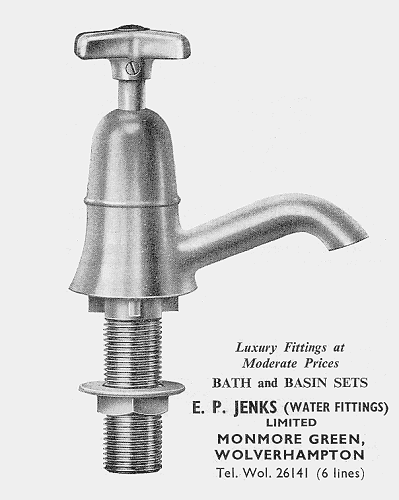
An advert from 1958. |
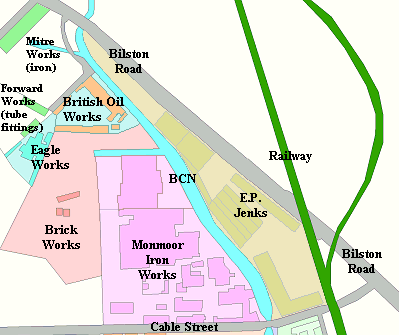 |
A map showing the location
of E. P. Jenks Limited. |
|
Eagle Works We
have little information about John Parsons or his
business. In the advert opposite, the list of products
includes spades, shovels, plantation hoes, light and
heavy edge tools, carpenter's tools, saddler's tools,
shoe maker's tools, heavy steel toys, augers, hammers,
hatchets, cutlasses, and all types of bright tools.
They
also refined all kinds of steel. |
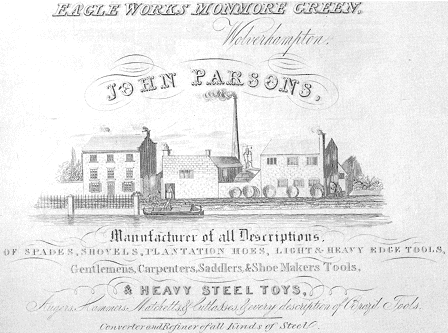
An advert from 1830. |
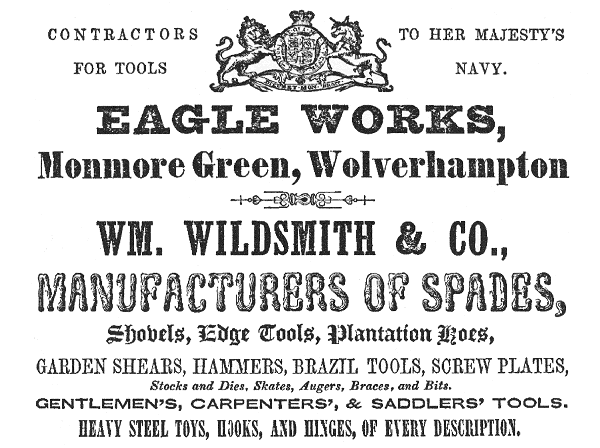
An advert from 1851 for William Wildsmith
& Company, at Eagle Works.
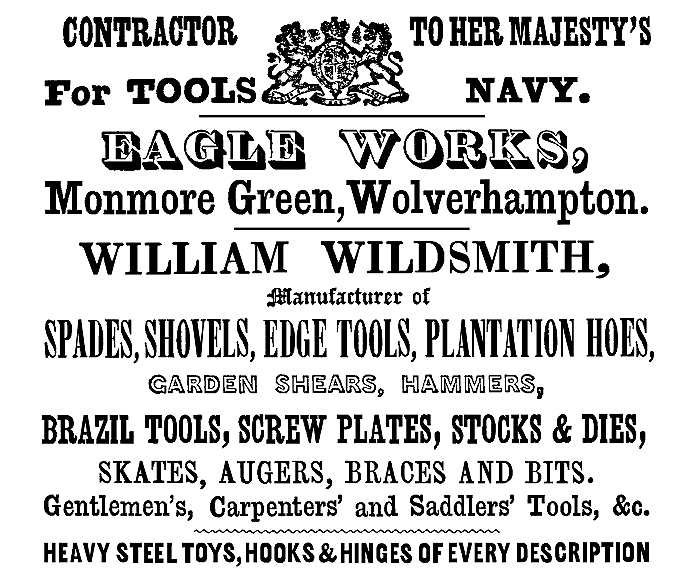
Another advert, also from 1851.
| The British Oil Works
By the end of the First World War, Gaunt & Hickman's
British Oil Works had moved from Colliery Road, onto
part of the derelict Eagle
Works site. More information about the company can be
found in Part 4. |
 |
Return to the Canals
and Industry Menu |
|